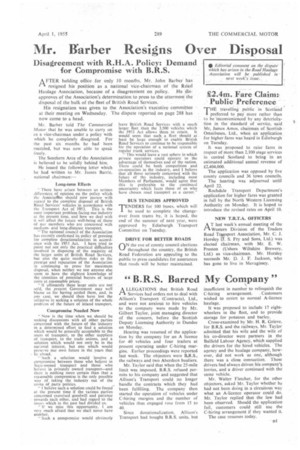Mr. Barber Resigns Over Disposal
Page 43

If you've noticed an error in this article please click here to report it so we can fix it.
Disagreement with R.H.A. Policy: Demand for Compromise with B.R.S.
A FTER holding office for only 10 months, Mr. John Barber has rm. resigned his position as a national vice-chairman of the Road Haulage Association, because of a disagreement on policy. He disapproves of the Association's determination to press to the uttermost the disposal of the bulk of the fleet of British Road Services.
His resignation was given to the Association's executive committee at their meeting on Wednesday. The dispute reported on page 288 has now come to a head.
Mr. Barber told The Commercial Holmthat he was unable to carry on as a vice-chairman under a policy with which he completely disagreed. For the past six months he had been
muzzled, but was now able to speak freely.
The Southern Area of the Association is believed to be solidly behind him.
He issued the following letter which he had written to Mr. James Barrie, national chairman:—
Long-term Effects There have arisen between us serious differences of opinion on the policy which the Associalbn should now pursue with regard to the complete disposal of British Road Services vehicles in accordance with the Transport Act of 1953. This is the most important problem facing our industry at the present time, and how we deal with it will affect the future well-being of those of our members who are concerned with mediumand long-distance transport. "
The national council of the Association has recently confirmed its policy of pressing for complete denationalization in accordance with the 1953 Act. I have tried to point out not only the practical difficulties involved in disposing of the majority of the larger units of British Road Services, but also the quite needless risks to the prestige and reputation of the Association in continuing to press for maximum disposal, when neither we nor anyone else seem to have the slightest knowledge of the identities of potential buyers of large units at reasonable prices.
" If ultimately these large units are not sold, the present Government may well blame us for having misled them, and, in any case, we should then have lost the initiative in seeking a solution of the whole problem of the future of inland transport.
Compromise Needed Now
" Now is the time when we should he seeking discussions with all other parties concerned with the future of the industry in a determined effort to find a solution which would be generally acceptable to the users of transport, to the other suppliers of transport, to the trade unions, and a solution which would not only be in the national interest, but one which would preserve our own future in the years that lie ahead.
Such a solution would involve a compromise between those who believe in State-owned transport and those who believe in privately owned transport—and there is nothing more certain than that a reasonable compromise is the only possible way of taking the industry out of the arena of party politics.
" I believe such a solution could be found at the present time if the various parties concerned exercised goodwill and patience towards each other, and had regard to the issues which in the past had divided us.
If we miss this opportunity, I am very much afraid that we shall never have another.
" Such a compromise would obviously
leave British Road Services with a much larger fleet than the 3.500 vehicles which the 1953 Act allows them to retain. It would seem that such a fleet should at least be large enough to enable British Road Services to continue to be responsible for the operation of a national system of regular trunk services.
" This would leave a vast sphere in which private operators could operate to the advantage of themselves and of the nation. There could be both competition and co-operation in the industry, and I believe that all those seriously concerned with the future of the industry, including most Members of Parliament, would agree that this is preferable to the continued uncertainty which faces those of us who have chosen road transport as a career."
BUS TENDERS APPROVED
TENDERS for 100 buses, which will be used to complete the changeover from trams by, it is hoped, the end of the summer of next year, were approved by Edinburgh Transport Committee on Tuesday.
DRIVE FOR BUFFER ROADS
ro the eve of county council elections throughout the country, the British Road Federation are appealing to the public to press candidates for assurances that roads will be better maintained.




















































































































